The mental health of students has become a hot topic especially in the past few years, with teachers not only having to care for the academics of their students, but also their emotional, physical and mental well-being. As a middle school counselor from New Hampshire, this educator knows first-hand the importance of caring for her student’s mental health and after taking course 854, Caring for the Mental Health of your Students, she shared some of her insights and lessons learned through this course. Be sure to check out course 854 for yourself and learn how to care for the mental health of your students.
Why is it essential for teachers to have an understanding of mental illness?
Teachers need to also be aware of why a student is misbehaving because of their noncompliance behavior versus when a student is battling mental illness with behavioral concerns. It isn’t always easy to ascertain why a student misbehaves thus consulting with appropriate school support services along with communicating with parents will help develop a plan of action to help support the student in and out of the classroom and to properly obtain an identification and intervention to the behavior.
First signs that may indicate a child may have a mental health disorder
Often, teachers are the first to notice different behaviors in children developing mental health disorders such as:
- Grades start plummeting
- Acting out behaviors may increase
- Student might show signs of disengaging with their peers socially
- Student absences may increase
- An overall state of angst can be prevalent in the student
- Students can become disengaged with school activities and extracurricular activities
How to develop a positive and productive classroom environment for students with emotional disorders and behavioral problems.
The first and most important thing that a teacher can do is “build a positive rapport through mutual respect and acceptance.”
To build this relationship of respect, unconditional acceptance and trust with students, it is crucial to:
- Be a good listener
- Use reflection in interactions with students
- (Usually) Never ask “why” as a question regarding students with behavioral difficulties
- Help students make a connection between their thinking, behavior and consequences
- Tone of voice needs to be non-threatening with a goal of having students feel comfortable to discuss issues with you
Once given the comfortable atmosphere of the classroom guidance lessons, students enjoy talking about themselves, which often opens up the door to students feeling more comfortable to discuss their personal experiences. Once this door is open, they are more apt to seek individual counseling to obtain extra help regarding their issues.






